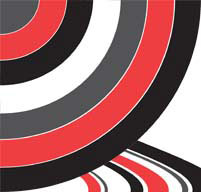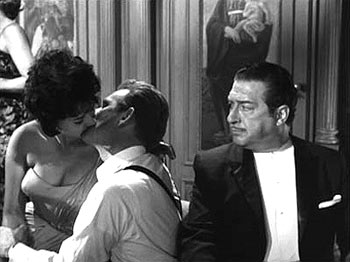Foetus, Limb
Published on July 30th, 2009 in: Art, Current Faves, Issues, Music, Music Reviews, Reviews |By Less Lee Moore
For a discussion of the Foetus NYC documentary, please read my review here.
Those fans introduced to JG Thirlwell via The Venture Bros. might be surprised (or perhaps confused) by the unique listening experience that Limb, the new Foetus release, provides. If you already knew about the avant garde and experimental reference points which inspired the pieces on Limb, you’ll likely have a different perspective on it than I do. So I’m not going to front and tell you I was intimately familiar with Steve Reich, Terry Riley, Philip Glass, and John Cage before I heard this album.

The liner notes indicate that it is an “archival release of some material recorded from 1980-1983, from the early days of Foetus and pre-Foetus.” This description may seem unassuming but listening to Limb, one understands the danger of trying to describe it in terms of what most people associate with Foetus. None of those buzzwords—industrial, post-punk, big band, rock, instrumental—accurately capture and define what Foetus is about, but Limb provides a fascinating glimpse into how Foetus came into existence.
In an unexpected yet welcome move, Thirlwell has provided detailed liner notes on each track. This is something which should not have been necessary for any of the other Foetus releases, but considering how many fans seem to think he is, by turns, a real-life misogynist, sociopath, and/or white supremacist, one hopes that they would pay careful attention here.
Some of these pieces have appeared on other releases or compilations and in other forms. The version of “Sick Minutes” on Limb, however, far surpasses the one found on Sink. The repeated, guttural noises in “Ezekiel’s Wheels” evoke the dreamlike, paranoid state of severe benzo withdrawal (or perhaps that’s just me). Things lighten up a little with “Te Deum,” if a piece based on Luis Buñuel’s darkly comic film The Exterminating Angel could be considered “light.”
“The Anxious Figure” contains repeated samples of classical music and has the same sinister aura I associate with The Wizard Of Oz. Both “Primordial Industry” and “Industrial Go-Slow” give us plenty of food for thought in both their sonic elements and their titles, but “That We Forbid” is a revelation, a phase piece that you will either worship or detest instantly. Another good juxtaposition of tracks appears between “Echolation” and “T045.” The former manipulates acoustic guitar in a variety of ways, while the latter utilizes flute and sitar sounds.

The Exterminating Angel, 1962
In what may be the oldest (newest?) example of Thirlwell’s continuing obsession with diseases and afflictions, “Sjogren’s Syndrome” refers to the inability to produce tears or saliva. It contains real or synthesized elements of woodwinds, brass, and strings, and its depth of emotion is remarkable.
The simplistically titled “Piano Piece” is gorgeous, described as “a phase piece without the drift.” You will hear these same piano tracks underneath “Te Deum” if you listen very closely. Here, however, the harmonic interaction is breathtaking.
“The Caterpillar Kid” is also far more unsettling that the title would imply (and is perhaps another “foetus” reference?), with lurching insectoid noises eventually transforming into something nearly resembling a hook.
“You Have To Obey” is another phase piece, this time 20 minutes long. It’s an MP3 which must be dragged onto the computer in order to be heard. And if you thought “That We Forbid” was challenging, you must hear this track in its entirety.
When listening to Limb on iTunes, its genre is listed as “unclassifiable,” a sly stab at those who might try to force descriptors upon it. Limb is not background music for housecleaning; it’s not intended for dullards who listen to “whatever’s on.” That limb Thirlwell has pushed us out on here is not just an aural one, though. It also confronts us with more philosophical questions: what do you enjoy about music, or more specifically, HOW do you enjoy it? That’s the thing about JG Thirlwell’s music: it pushes your mind into directions that you do not expect, into realms you did not know existed.
JG Thirlwell is currently scoring the fourth season of The Venture Bros. In a recent radio interview on WFMU, he indicated plans for a Manorexia chamber ensemble performance to released on CD later this year, more work with LEMUR, and a possible new Foetus album in 2010. Stay tuned to Foetus.org for ongoing developments.
RELATED LINKS:
The Venture Bros., The Music Of JG Thirlwell, Popshifter May/June 2009 issue
JG Thirlwell’s Best Of 2008 List, Popshifter January/February 2009 issue
Crushing The Mold: An Interview With JG Thirlwell, Popshifter March/April 2008 issue
3 Responses to “Foetus, Limb”
July 30th, 2009 at 10:26 pm
[…] For a discussion of the music on Limb, please read Less Lee’ Moore’s review here. […]
August 1st, 2009 at 2:00 pm
I was REALLY impressed with LIMB. And I’m usually impressed with Foetus albums. (Particularly LOVE, which remains my favorite.) But yes — the phase pieces are wonderful. I love that kinda stuff — it really made me want to experiment with that sorta thing myself. Perhaps Kittysneezes will release an album of that or something someday.
August 4th, 2009 at 1:42 pm
[…] Thirlwell posted links to our reviews of Limb on his Facebook […]
Time limit is exhausted. Please reload the CAPTCHA.